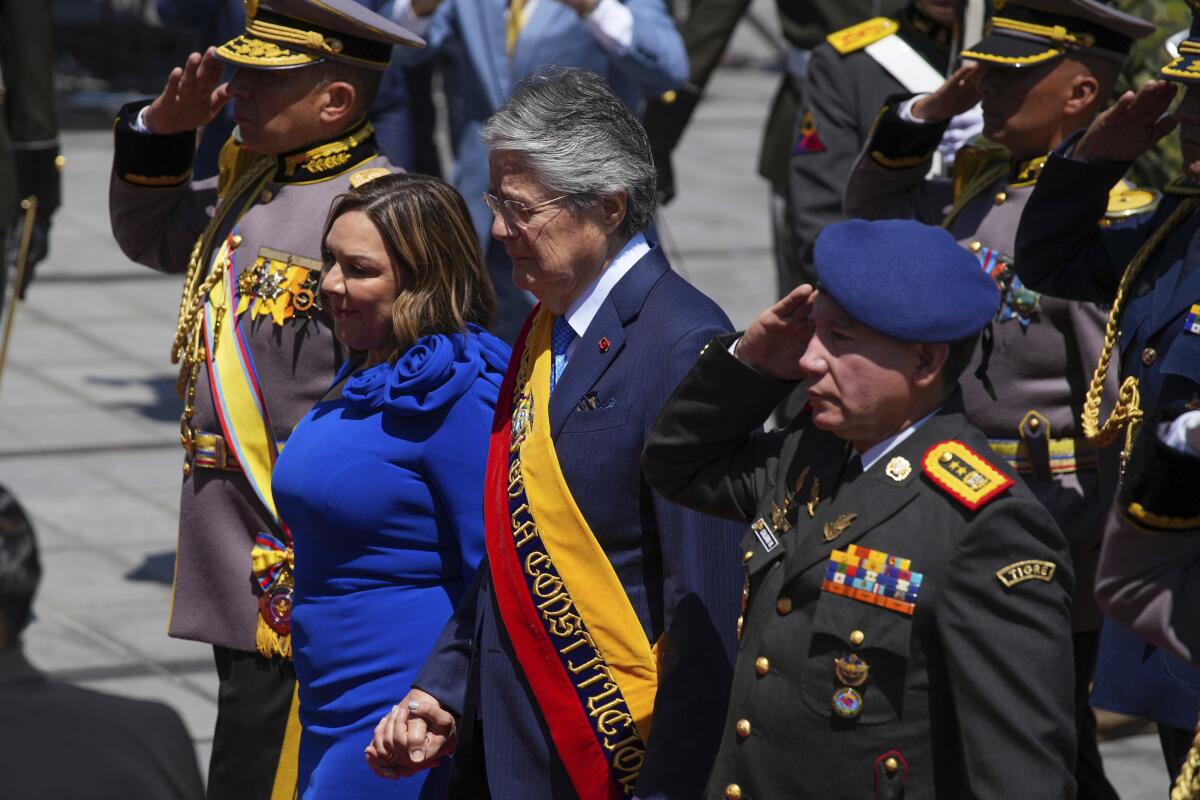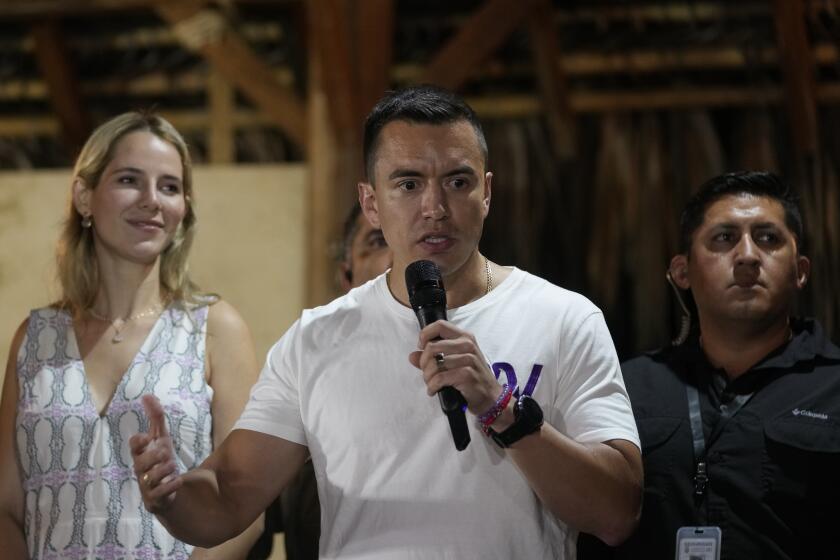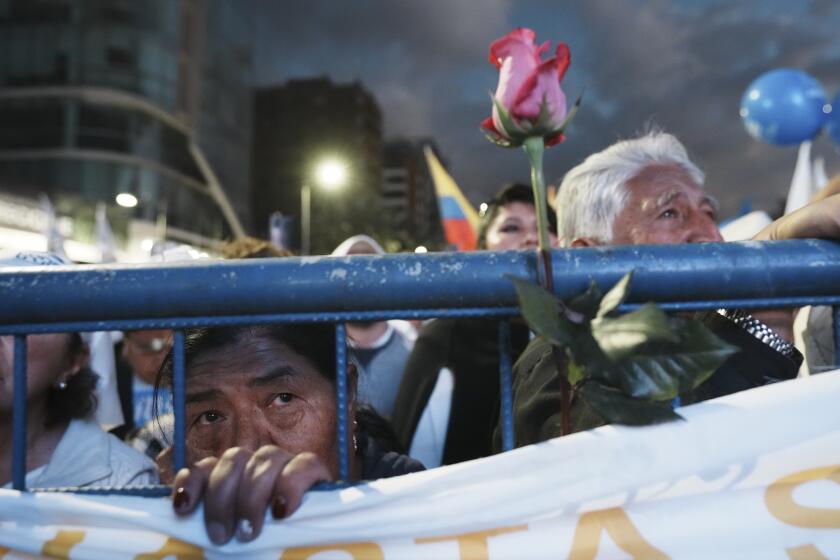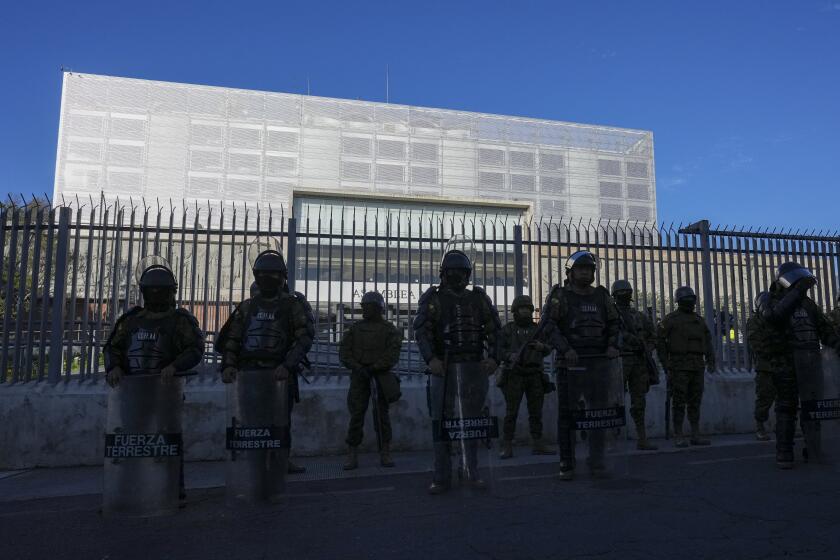Inexperienced politician dives in as Ecuador’s president, leading a country on edge

- Share via
QUITO, Ecuador — Daniel Noboa, an inexperienced politician and heir to a fortune built on the banana trade, was sworn in Thursday as Ecuador’s president, a role that citizens are demanding he use to restore the public safety that drug cartels and other criminal organizations robbed them of at the decade’s start.
Noboa’s term will run only through May 2025, which is what remains of former President Guillermo Lasso’s tenure. Lasso cut his term short when he dissolved the National Assembly in May as lawmakers pursued impeachment proceedings against him.
The head of the country’s newly elected legislature, Henry Kronfle, placed the presidential sash on Noboa during a ceremony in Quito, the capital.
Under Lasso’s watch, violent deaths in Ecuador soared, reaching a record 4,600 in 2022, which was double the number from the year before. Killings, kidnappings, robberies and other criminal activities became part of Ecuadoreans’ everyday life.
The assassination of presidential candidate and anti-corruption crusader Fernando Villavicencio as he left a campaign rally in August underscored the country’s fragile security situation.
Daniel Noboa, just 35, won a runoff election against a leftist lawyer to become the next president of Ecuador, which is beset by spiraling violence.
Noboa’s only experience in government was as a member of the National Assembly that Lasso dissolved. He is inheriting a weakened economy and serious fiscal challenges as well as the leadership of a country racked by violent crime.
“The economy and security are indivisible issues; it is an important front on which President Noboa must work,” Andrés Briones, an analyst and professor at Casa Grande University in Guayaquil, Ecuador, said. Noboa’s government will have to “undertake tax reforms to encourage growth and the revitalization of the economy.”
But any actions he wishes to take to address Ecuador’s crucial issues will first require him to negotiate with the National Assembly, where his party lacks enough seats to govern on its own.
The spike in violence is tied to the trafficking of cocaine produced in neighboring Colombia and Peru. Mexican, Colombian and Balkan cartels have set down roots in Ecuador and operate with assistance from local criminal gangs.
Noboa has made a list of proposals to improve security, including the use of barges to house inmates and the acquisition of more gear for police. While those ideas helped him get elected on Oct. 15, he now faces the challenge of leading a population frightened to the point of opting to stay home as much as possible.
Ecuador held special election for a new president amid unprecedented violence, including the assassination of a candidate this month. A runoff appears likely.
“We have been kidnapped by organized crime,” Alejandro Zabala, a professor at the University of Las Américas, said.
But Zabala thinks the heavy-handed policies imposed by Lasso were “an absolute failure” and suggested the government must clean up the ranks of law enforcement, invest in equipment for police and join regional and international efforts against organized crime, as Ecuador “cannot win this war alone.”
Like Lasso, a conservative former banker, Noboa’s wealth puts him at the top of Ecuador’s elite. His father, Álvaro Noboa, is among Ecuador’s richest people thanks to a conglomerate that started in the growing and shipping of bananas and now includes more than 128 companies in dozens of countries.
The elder Noboa unsuccessfully ran for president five times.
The younger Noboa opened an event organizing company when he was 18 and then joined his father’s Noboa Corp., where he held management positions in the shipping, logistics and commercial areas. His political career began in 2021, when he got a seat in the National Assembly and chaired its Economic Development Commission.
The president disbanded the National Assembly to avoid impeachment. The move bodes ill for the country’s democracy and could return Rafael Correa to power.
Ecuador’s fiscal mess is in part the result of declining revenues from tax collection and oil exports, on which the country largely depends.
Data from the Ministry of Finance show state coffers received $991 million from oil between January and July. That’s less than half of the $2.3 billion the state received during the same period last year. Meanwhile, tax collections this year fell by $137 million.
The country’s fiscal deficit is expected to be around $5 billion by the end of the year, or more than 5% of its gross domestic product.
Former Minister of Economy and Finance Fausto Ortíz said Lasso had good fiscal management of the economy, adhering to instructions of the International Monetary Fund, with cuts in public spending and state investment and a sustained reduction in the fiscal deficit.
But, Ortíz argued, “the fiscal part is not everything in the management of a country,” and the strategy has brought unintended consequences: no economic growth and no employment growth.
“The result is not favorable,” he said.
More to Read
Sign up for Essential California
The most important California stories and recommendations in your inbox every morning.
You may occasionally receive promotional content from the Los Angeles Times.
















